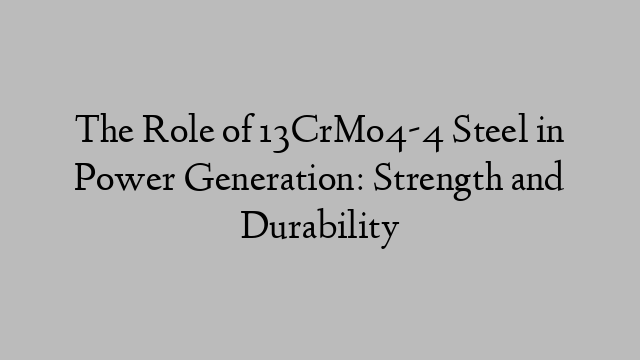Address
304 North Cardinal St.
Dorchester Center, MA 02124
Work Hours
Monday to Friday: 7AM - 7PM
Weekend: 10AM - 5PM
Address
304 North Cardinal St.
Dorchester Center, MA 02124
Work Hours
Monday to Friday: 7AM - 7PM
Weekend: 10AM - 5PM

Introduction:
In the field of power generation, materials with exceptional strength and durability are crucial for the successful operation of power plants. One such material that plays a vital role in this industry is 13CrMo4-4 steel. This specification will explore the mechanical properties, chemical composition, and the significance of 13CrMo4-4 steel in power generation.
1. Mechanical Properties:
The mechanical properties of 13CrMo4-4 steel make it an ideal material for power generation applications. It exhibits high tensile strength, which provides the necessary structural integrity and resistance against stress and load-bearing capacities. The minimum yield strength of this steel is 290 MPa, while its ultimate tensile strength is approximately 440-590 MPa. Additionally, it possesses excellent toughness and impact resistance, ensuring that it can withstand sudden and unpredictable forces without failure.
2. Chemical Composition:
The chemical composition of 13CrMo4-4 steel significantly contributes to its strength and durability. It is primarily composed of carbon (C), manganese (Mn), phosphorus (P), sulfur (S), chromium (Cr), and molybdenum (Mo). The carbon content improves its hardenability and overall strength, while the manganese content enhances its ductility and toughness. The addition of phosphorus and sulfur aids in the steel’s machinability and improves its resistance to corrosion. However, it is the presence of chromium and molybdenum that truly distinguishes 13CrMo4-4 steel. These alloying elements promote high-temperature strength, oxidation resistance, and the ability to withstand creep deformation. The steel typically contains 0.08-0.18% carbon, 0.30-0.60% manganese, 0.025% phosphorus, 0.010% sulfur, 0.70-1.15% chromium, and 0.45-0.65% molybdenum.
3. Significance in Power Generation:
The role of 13CrMo4-4 steel in power generation is crucial due to its exceptional strength, durability, and resistance to high temperatures and pressures. It is commonly used in the construction of power plant boilers, steam pipelines, and pressure vessels. These components are subjected to extreme conditions, including high temperatures and corrosive environments, which can lead to material degradation. However, 13CrMo4-4 steel’s ability to withstand these harsh conditions ensures the longevity and reliability of power generation systems. Furthermore, its high creep strength allows it to maintain its structural integrity over long durations, even under constant stress and exposure to high temperatures.
Conclusion:
In conclusion, 13CrMo4-4 steel plays a vital role in the power generation industry due to its exceptional strength, durability, and resistance to high temperatures and pressures. Its mechanical properties, including high tensile strength, toughness, and impact resistance, make it suitable for critical components such as boilers, steam pipelines, and pressure vessels. The chemical composition of this steel, particularly the presence of chromium and molybdenum, enhances its high-temperature strength and resistance to corrosion. With the use of 13CrMo4-4 steel, power generation systems can operate efficiently and reliably, ensuring the continuous supply of electricity.
13CrMo4 4 Steel grade
1698264940